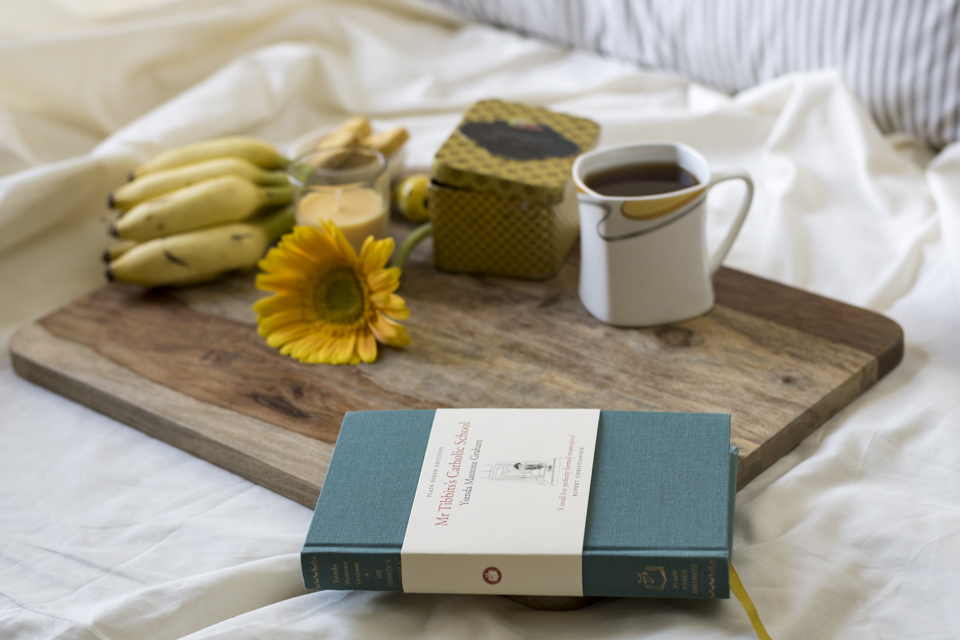Reader. Dreamer. Writer.
For someone who feasted on Enid Blyton’s Malory Towers and St. Clares books, Mr. Tibbit’s Catholic school was an enticing title. I had started reading Terms and Conditions by Ysenda Maxtone Graham first but since the beginning pages bore little similarity to Blyton’s fictional boarding schools that I grew up reading, I switched it for Mr. Tibbit’s Catholic school, the story of a private school in Kensington.
Upadte : I absolutely adored Terms and Conditions when I picked it up later.
The School
I was happy I made the decision because this book was a fast read for me. The book gives a true picture of the characteristics of English boys’ schools – pants-down beatings with a slipper (or hard shoe as some students recall it), meals of watery mashed potatoes that could not be skipped, all the children in the dining room forced to wait until everyone finishes everything on their plates and cricket games played in cold weather wearing a shirt and itchy wool shorts (underpants not allowed).
The school ((now St. Philips) in South Kensington has an interesting history. Mr Richard ‘Dick’ Tibbits was a member of the Church of England who converted to Catholicism. One day, a priest at the Brompton Oratory remarked that there were no good private schools for Catholic boys in that region of London. Thus in 1934, Tibbits offered to take up the task. He bought a house, founded the school, taught the boys and even fetched them from their home and dropped them back after school.

The Non-Humane Side
We see Mr. Tibbit’s personal side when he marries a chain smoker. Mrs. Tibbits was generally not liked much and was crucial in deciding and sticking to the detestable menus. She was an extremely xenophobic person and was brutal enough to pass hurtful remarks with no remorse. She disliked the Poles and showed her open dislike to the Irish. She had strong, sometimes twisted opinions, about some of the teachers enrolled at the school and she did not shy from speaking her mind out loud. She was also a pioneer of gender inequality in spite of being a woman herself. The lady teachers were never invited for tea but the male teachers were. For Christmas while the ladies were given only a card, the male teachers got more benefits. We see a humane side of Mrs. Tibbits as she is nearing her death – she dearly loves her school boys. But her racism and xenophobia overpower the deathbed sentiments.
Mr. Tibbits nursed such notions too, one being that potatoes were banned in school because he had seen an Indian peeling it in between his toes. Being from India, I have not seen this nor can I imagine how anyone can peel potatoes in between toes without cutting themselves. Many such remarks from the main characters made the read a little uncomfortable at times, though this is no fault of the book’s but rather an honest take on the views of the different characters. I was a bit disturbed by the narrow minds that view people of other countries as lesser human beings and women being treated unequally; and I admit it required some effort to not ponder along those lines but see them in the light of the time period in which such sentiments existed.
The Cast
Ysenda captures the nuances of the different headmasters from the beginning of the school. This was a delightful character sketch as each one had their share of strengths and weaknesses. It is interesting that Mr. Tibbits (described as ‘a Beatrix Potter drawing of a very nice old pig’) is remembered as a kind and wonderful man by the first batches of students but as a hard and strict man with a vile temper by the later batches. He is remembered as being extremely devoted to the boys in his school and urging them to strive for academic excellence. One former student recalls, “You were expected to be good at drawing, good at reading, interested in foreign lands”. However Mr. Tibbits was not encouraging in matters of science because he believed that “Gentlemen do not study science”.
Ysenda is especially sympathetic to the retired headmaster David Atkinson who would not be interviewed for the book. Even when he retired, he refused to have a retirement party and threw almost all his belongings, including some important souvenirs, (some were saved by his colleagues from the dump) before disappearing to the country. He was extremely invested in the school teams winning at sports. His joint headmaster, a young Harry Biggs-Davison, took over the headship (and still serves the school as headmaster) has a pivotal role in transforming the school into a place of true educational excellence.
The school also had an eccentric cast of teachers, who adorn many hilarious passages in the book. A teacher, awaiting his inheritance, walks out the classroom and quits the moment he receives news that he was suddenly rich. A beautiful Polish princess arrives as a maternity-leave replacement for one of the few women teachers and falls in love with the geography instructor. John Tregear, the French teacher, “wore black boots with red cork high heels and drainpipe trousers”.
The Research
Ysenda is the best writer for the biography of this school because she has first hand experience with it. Her sons study in the same school. She has interviewed many of the former students including the famous Julian Fellows and mothers (Antonia Fraser) of students. She even met with dead ends like the time when the Earl of Gainsborough who had agreed to give an interview died before the appointment. But on the whole, the book is well-researched and wonderfully written.
However Ysenda comes off as a bit of a writer who emphasizes certain facts more than she should, almost as if she is scared the reader would miss the point she is trying to convey. This is prominently conveyed when she introduces Mrs. Tibbits, who was on the whole too-racist and an unlikeable character. Ysenda tries to put on a little more emphasis than necessary on the contrived views of Mrs. Tibbits when the character is introduced in the book. This could have been done away with because by the middle of the novel the reader understands the true nature of Mrs.Tibbits; without authorial remarks.
Charming memories housed in a private school in Kensington Share on X
THE PRESENT
I enjoyed that Ysenda Maxtone Graham touches on how the management policies of the school changed over the years. After Mr. Tibbit’s death, there were problems between the school and the Oratory and some parents were anxious whether the religious education imparted was of high standard. Mr. Tibbits was a strict man and did not encourage showing off the school to prospective parents during the working hours of the school. But many years later, this is included as part of the marketing strategy to attract parents when the competition from other schools became threatening. There is also the rise of a new generation of mothers who took great interest in the working of the school and tried to bring on their own reforms.

Final Verdict
The book is a delightful read, laced with humour and steeped in honest portrayal of a way of life. Kath Walker’s illustrations add a nice flavour to the story of the school. Overall, the book is well researched and filled with many anecdotes.
Title : Mr. Tibbit’s Catholic School
Author : Ysenda Maxtone Graham
Publisher : Slightly Foxed
Published : 2011
Language : English
Pages : 199
Rating : 3.5/5
Disclaimer : Much thanks to Slightly Foxed for a copy of the book. All opinions are my own










I see that you enjoyed it but that potato peeling thing makes this a miss for me. Pity since it sounds so good! 🙁
It was a nice read but you really have to put yourself far from the racist views of the characters (even though that does not say anything bad about the book or the author since the author is merely stating them). But I know you understand how it can be a little difficult to read. What is with the potato peeling? It sounds like a made up lie, right? Similarly, Mrs. Tibbits once compares a beggar to Irishmen asking ‘Is he Irish’ in front of a new priest at the school who is actually Irish. Basically, I think they liked none of the people from other countries.
That is such terrible behaviour. And I know I should distance the character’s views from my emotions but I just can’t do that. I get to frustrated. It definitely sounds like a lie. No one has such dexterous toes.
Haha. Yes! How can anyone peel a potato between your legs? Right?
Hmph. Exactly.
This does sound good and I was tempted because it’s set in a boarding school kind of environment- but all that talk of how xenophobic it is puts me off. Also- that stuff about potato peeling is just plain weird and clearly nonsensical! Great review though!
Yes, that really was the case. Something bothers you at the back of your head that even though the school stories are so delightful, the people who headed it were not very accepting. It is a good read if you can separate both the facts. If you like boarding school stories, I think you will enjoy Terms and Conditions by the same author. I am reading it right now and it is delightful indeed.I will put up a review soon.
Ah yes I totally get that. Ah thank you for the recommendation- that’s really good to know. Brilliant! I look forward to your thoughts.
This does sound like a really interesting read, although it would definitely be a challenge for me to read such racist comments and not want to throw the book across the room. I’m glad you enjoyed the read though.
I’m thrown off by the potato peeling by toe comment — why would anyone believe this because it sounds so implausible, not to mention SO MUCH HARDER than just peeling by hands? I know the book is meant to reflect the thinking of the time, but to put racist or bigoted remarks in a novel without challenging it somewhat seems poor form. I’m glad you enjoyed the book despite these issues, though.
I am glad you understand Aentee. I am also glad the author put this in the book though, because it gives a clear picture of how even educated people thought of non-white people during those time. And yes, I thought the same as you. How can anyone peel with a potato in between the toes when using hands is so much easier.